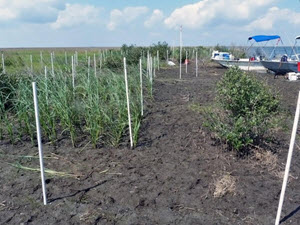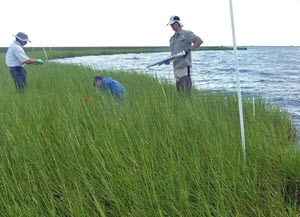
Restoration/remediation plots set up in a previously heavily oiled shoreline marsh along the northern Barataria Bay, Louisiana. (Photo provided by Qianxin Lin)
Marshes depend on a healthy, well-functioning complex of plants, microbes, and benthic communities to support the environmentally and economically important ecosystem services they offer, such as reducing storm surges and providing nursery grounds for many species. Researchers have been conducting studies assessing Louisiana marsh flora and fauna after the 2010 Deepwater Horizon oil spill and have identified factors influencing the plant-microbial-benthic complex’s function and long-term sustainability. Their work-to-date suggests that recovery is occurring but is not yet complete, highlighting the need for a much longer-term study to better quantify marsh recovery and resiliency.
The Gulf of Mexico Research Initiative recently awarded Dr. Qianxin Lin a grant to bring together marsh ecosystem researchers and build on their previous work. Specialists are collecting and analyzing samples of marsh plants, benthic organisms, and microbes and are synthesizing their observations to identify connections and influence on oiled marsh recovery. Their findings will help document long-term impacts on the coastal plant-microbial-benthic ecosystem and assess the recovery timeline. They are also evaluating the effectiveness of certain restoration and remediation strategies in promoting long-term sustainability in oil-affected marshes.

Sean Graham, Stefan Bourgoin, and Don Deis collect samples at a study site in northern Barataria Bay, Louisiana. (Photo provided by Qianxin Lin)
“Researchers are usually specialists who study just one of these components [plants, microbes, benthic communities] rather than all of them,” explained co-Principle Investigator John Fleeger. “We have a group of investigators who are working together to look at all of those parts, and we’re really getting the whole picture of how the marsh is responding.”
The researchers have been sampling the plant-microbial-benthic complex every six months for the last five and a half years. While their previous work focused on how the different components of the marsh responded to oil, they are now focusing on the long-term and larger picture of ecosystem recovery. Team members return to study sites and collect samples for each component of the study. Some will count the number of periwinkle snails, fiddler crab burrows, and aboveground plant stems present in the field and collect belowground root and rhizome samples. Others analyze soil samples using microscopes and DNA extractions to identify the functional microbial community. They are also testing soil shear strength to determine how stable it is and to make observations about oiling’s influence on the soil’s stability or erosion rate.
The team has already uncovered some of the plant-microbial-benthic connections they are seeking. For example, their work has shown that plants, such as the grass Spartina, and the densities of animals living in the sediment recovered at the same pace, suggesting that the recovery of sedimentary animals is closely correlated with plant recovery. Fleeger explained, “We have to make these connections thinking ‘What did the plant people find? What did the benthic people find? How can we look at those findings together and make connections within them?’ There’s no one big magic index that allows us to put all of the data in one big formula and crank out a number. We have to actually gauge how the different components are responding and then piece it together.”
The researchers plan to expand their work this summer to include field manipulative experiments that look closely at linkages they have identified, such as the relationship between plants and periwinkle snails. The team will investigate how strong these interactions are and how oil might tip the balance between the plants’ sustainability and the numbers of the snails eating them. They are also building on past experiments to evaluate the long-term effectiveness of restoration plantings and remediation with fertilizer. Initial assessments of the experiments have shown promising short-term results towards accelerating the pace of recovery and enhancing marsh stability. The team will continue experimenting with and evaluating combinations of planting and fertilizer to determine their viability as methods for enhancing long-term marsh recovery.
The project’s researchers are Qianxin Lin, John Fleeger, and Aixin Hou at Louisiana State University, Donald R. Deis at Atkins North America, Inc., and Sean Graham at Nicholls State University. Their project is Long-Term Impact, Recovery and Resilience: Wetland Plant-Microbial-Benthic Ecosystem Responses to the Deepwater Horizon Oil Spill and Mitigation Strategies Promoting Sustainability.
************
The Gulf of Mexico Research Initiative (GoMRI) is a 10-year independent research program established to study the effect, and the potential associated impact, of hydrocarbon releases on the environment and public health, as well as to develop improved spill mitigation, oil detection, characterization and remediation technologies. An independent and academic 20-member Research Board makes the funding and research direction decisions to ensure the intellectual quality, effectiveness and academic independence of the GoMRI research. All research data, findings and publications will be made publicly available. The program was established through a $500 million financial commitment from BP. For more information, visit http://gulfresearchinitiative.org/.
© Copyright 2010- 2017 Gulf of Mexico Research Initiative (GoMRI) – All Rights Reserved. Redistribution is encouraged with acknowledgement to the Gulf of Mexico Research Initiative (GoMRI). Please credit images and/or videos as done in each article. Questions? Contact web-content editor Nilde “Maggie” Dannreuther, Northern Gulf Institute, Mississippi State University (maggied@ngi.msstate.edu).
